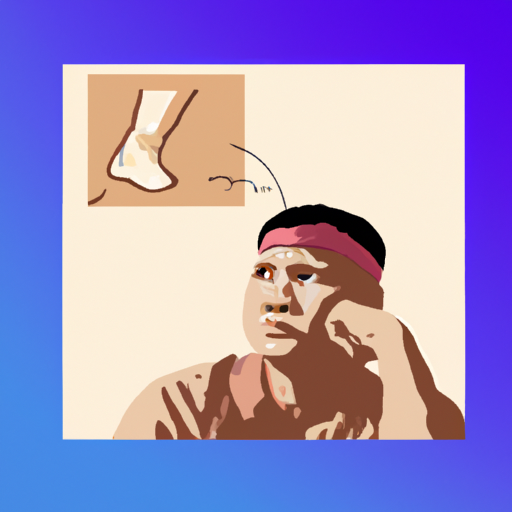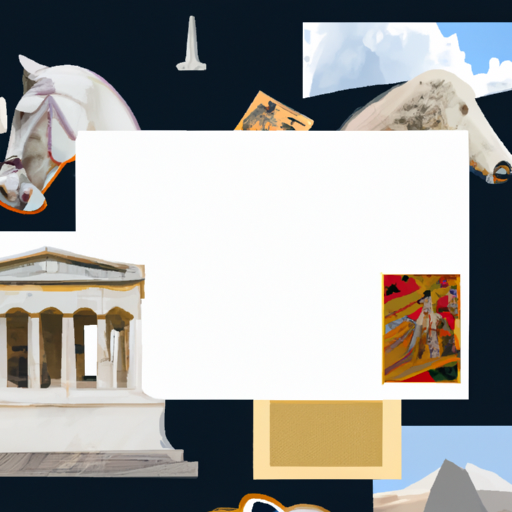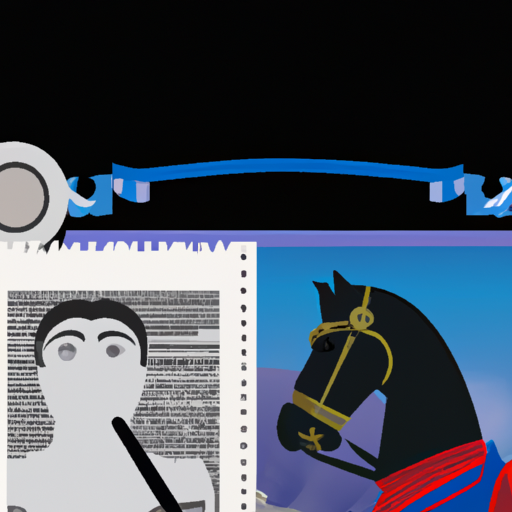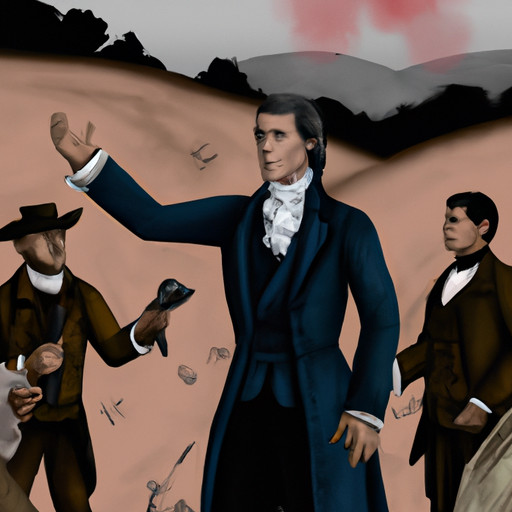History of Christianity: Who Created the Religion?
Unearth the secrets of Christianity! Trace its origins and uncover the mastermind behind its conception! Delve into the past to explore the mysteries that shroud this religion. Uncover the truth, and explore who was responsible for bringing it into existence!

For two millennia, a tale of Christian origins has unfolded. Starting in the Middle East, this faith has spread throughout the world and become one of the most influential religions in human history. To understand its beginnings, we must look to its founder: Jesus Christ. According to tradition, he was born into a Jewish family in 1st century Palestine and baptized by John the Baptist. He preached about God’s love for humanity and soon gained followers who believed him to be the promised Messiah of Jewish prophecies. After his crucifixion, his disciples claimed he had risen from death three days later and ascended into heaven.
His apostles then took his teachings far and wide throughout the Roman Empire and beyond, eventually forming an organized religious movement known as Christianity. Through missionary work and conversion efforts, it rapidly became one of the most popular religions in Europe and Asia Minor. By 4th century CE, it had been established as Rome’s official religion under Emperor Constantine I. As time passed, it continued to expand across the globe while adapting to different cultures’ traditions.
Presently, Christianity is still among the largest religions with over 2 billion adherents worldwide; its influence can be seen in artworks, literature pieces, politics, music – all due to Jesus Christ and those who followed him centuries ago!
.
Introduction

A mysterious figure, Jesus of Nazareth, is said to have come from the heavens and spread his teachings across the lands of Judea. Believed by many to be the Son of God, he began his public ministry in approximately 27 AD and expounded upon the Old Testament of the Bible. His words were taken up by a devoted following that spread his message far and wide, eventually leading to what we know today as Christianity. As time passed, this faith increased in size until it became one of the most popular religions in existence. Throughout its history, Christianity has been influenced by numerous individuals and movements who have left their mark on its beliefs and practices.
– History of the Origins of Christianity
Throughout the ages, Christianity has been a powerful presence in the world, with its roots stretching back to the 1st century and its followers numbering more than two billion. Its beginnings can be traced to Jesus and his apostles, who spread their message throughout the Mediterranean region. At this time, Christianity encountered persecution and opposition from other faiths such as Judaism and paganism. Despite this, Christian communities were formed in places like Rome and Antioch.
In the 4th century AD, Emperor Constantine declared Christianity as the official religion of the Roman Empire, leading to various branches such as Eastern Orthodoxy and Catholicism. This would later be followed by a schism in 1054 AD that created two distinct branches: Eastern Orthodoxy and Roman Catholicism. In 1517 AD, Martin Luther initiated the Protestant Reformation which further divided Christianity into numerous denominations across Europe and North America.
Today, thousands of different Christian denominations exist around the world with varying beliefs and practices. Despite its long history filled with conflict and division, Christianity remains an influential force in society today as it continues to shape culture and values globally.
– Historical Development of Christian Beliefs
The story of Christianity has been one of ever-changing beliefs and practices over the centuries. From its humble beginnings in the 1st century CE with Jesus of Nazareth at its core, it has spread far and wide to become one of the world’s most prominent religions. Various denominations have emerged, each offering their own unique interpretations of scripture and traditions.
During the Middle Ages, Christianity was closely linked to political power in Europe, with the Catholic Church a major influence on politics and culture. This period also saw new forms of religious expression such as monasticism and mysticism that sought to bring individuals closer to God through spiritual practices outside traditional church structures.
The Reformation marked a pivotal moment for Christianity when Martin Luther posted his Ninety-Five Theses criticizing certain aspects of Catholic doctrine in 1517. This sparked a wave of reforms throughout Europe resulting in the establishment of Protestant churches distinct from Catholicism. It also shifted towards greater individual autonomy within religious practice as people began to rely more heavily on their own interpretation of scripture rather than relying solely on church authorities for guidance.
In modern times, Christianity has continued to evolve as it encounters new cultural contexts around the world and responds to social issues such as poverty, racism, sexism, and environmental degradation. As believers grapple with these challenges they are developing new ways to understand their faith while still holding true to core principles such as love for all humanity regardless of race or religion. Through these changes Christian beliefs continue to evolve yet remain deeply rooted in history.
– Ancient Jewish Roots of Christianity
The intricate, complex history of Christianity is steeped in the ancient Jewish faith. A sect within Judaism, Christianity was greatly impacted by its parent religion’s teachings and customs. In fact, Jesus Himself was a Jew and His followers initially continued to observe the laws and traditions of their parent religion. Over time, however, Christianity became its own distinct faith with unique beliefs and practices. Despite this divergence, there are still many aspects of modern Christianity that bear a striking resemblance to their Jewish roots.
The Bible itself provides an example of this influence. The Christian Bible is composed of two separate testaments: the Old Testament based on the Hebrew Scriptures and the New Testament containing stories about Jesus’ life and ministry. This duality reflects how Christianity has both evolved from Judaism and established itself as an independent faith with its own distinct teachings.
Christian rituals also have their origin in Jewish tradition; baptism is an important part of many Christian denominations today but it originated from ancient purification rituals like mikvah or tevilah practiced in Judaism. Similarly, some Christian holidays such as Easter are derived from ancient Jewish festivals like Passover.
In addition to religious practice, many Christian beliefs about God have been influenced by traditional Jewish concepts such as monotheism (belief in one God), covenantal relationship between God and humanity, sacredness of scripture etc., which have been passed down through generations until they became integral parts of modern Christian theology.
It’s clear that without these ancient Jewish roots, Christianity would not exist today as we know it; from religious practice to theological beliefs, much of modern Christianity has been heavily affected by their parent religion’s long history and rich tradition.
– Historical Impact of Christianity on Society
Throughout history, the world has been profoundly affected by Christianity’s presence. Originating in the first century AD, this religion has had a major impact on politics, art, literature, and social norms everywhere.
In Europe during the Middle Ages, laws were based on Christian principles such as justice and mercy. To this day, many countries still uphold these same values in their legal systems. Artistic expressions of Christianity can be found in paintings and sculptures dating back to ancient times. The Bible is considered one of the greatest works of literature ever written, and religious music continues to be an integral part of worship services today.
Christianity has also had a great influence on social norms around the world. Many cultures have adopted aspects such as monogamy and charity from Christian teachings. Additionally, Christians often prioritize education which has helped spread knowledge about science, math, language arts and more throughout history.
It’s clear that Christianity has had an immense impact on society since its inception centuries ago; it continues to shape the lives of people across the globe today in countless ways.
– A Timeline of Christianity’s Major Historical Events
Centuries ago, a man named Jesus Christ was born in Bethlehem, and his teachings formed the basis of what is now known as Christianity. In 30 A.D., He was crucified and His death marked the start of this faith’s distinct existence. Around the same time, Paul began to spread Jesus’ teachings to non-Jews, allowing Christianity to expand beyond its Jewish roots. The church was then founded with bishops, priests and deacons appointed by apostles or their successors in the 50-100 A.D. era.
In 313 A.D., Emperor Constantine issued an edict granting religious freedom to Christians throughout the Roman Empire and making it a legal religion; three years later, at the Council of Nicaea, a statement on Christian doctrine known as the Nicene Creed was developed after discussing issues such as Trinitarianism and Christology. Then in 380 A.D., Emperor Theodosius I declared Christianity to be Rome’s official state religion – making it a major force in Europe for centuries to come.
The Great Schism happened in 1054 A.D., splitting Christianity into two branches: Eastern Orthodoxy and Roman Catholicism – divisions which still exist today between these two faiths. Martin Luther’s 95 Theses criticizing certain practices within Roman Catholicism such as indulgences and clerical celibacy sparked off the Protestant Reformation in 1517 A.D., leading to further divisions within Christianity as numerous Protestant denominations emerged over time throughout Europe and North America..
In more recent times, ecumenical movements have been striving towards reuniting various branches of Christianity while simultaneously allowing for greater diversity among believers; Pentecostalism has also experienced remarkable growth worldwide due largely to its focus on spiritual gifts such as healing and speaking in tongues..
Today, despite remaining distinctions between some denominations, Christianity is one of the world’s biggest religions with over 2 billion adherents all over; meanwhile, new forms of expression like “post-evangelical” churches have begun emerging in response to changes in cultural contexts around them..
conclusion

Mysteriously, a figure of peace and love appeared in the 1st century AD, captivating the people of Israel. This individual’s teachings quickly spread throughout the Roman Empire, eventually becoming its official religion. Now, it is an immense faith with billions of devotees across the globe.
.
Some questions with answers
Q1. Who created Christianity?
Christianity was founded by Jesus Christ and his apostles.
Q2. When was Christianity founded?
Christianity was founded in the 1st century AD.
Q3. What is the history of Christianity?
The history of Christianity dates back to the life and teachings of Jesus, who lived in the Roman province of Judea during the first century A.D. The religion has since spread around the world, becoming one of the most influential belief systems in history.
Q4. How did Christianity spread?
Christianity spread through missionary work, colonization, and trade routes as well as other forms of evangelism. It also spread through word-of-mouth, with people sharing stories about Jesus with their friends and family.
Q5. What is the importance of Christianity in history?
Christianity has had a profound impact on Western civilization, influencing its art, literature, politics, philosophy and culture for centuries. It has also been an important factor in shaping social values and morality throughout much of human history.




